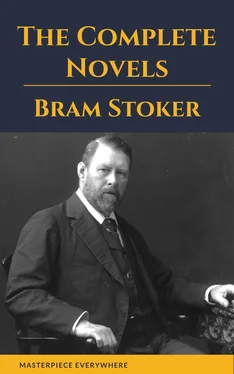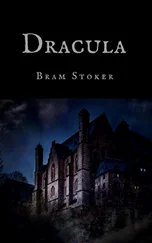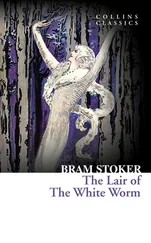Bram Stoker - Bram Stoker - The Complete Novels
Здесь есть возможность читать онлайн «Bram Stoker - Bram Stoker - The Complete Novels» — ознакомительный отрывок электронной книги совершенно бесплатно, а после прочтения отрывка купить полную версию. В некоторых случаях можно слушать аудио, скачать через торрент в формате fb2 и присутствует краткое содержание. Жанр: unrecognised, на английском языке. Описание произведения, (предисловие) а так же отзывы посетителей доступны на портале библиотеки ЛибКат.
- Название:Bram Stoker: The Complete Novels
- Автор:
- Жанр:
- Год:неизвестен
- ISBN:нет данных
- Рейтинг книги:3 / 5. Голосов: 1
-
Избранное:Добавить в избранное
- Отзывы:
-
Ваша оценка:
- 60
- 1
- 2
- 3
- 4
- 5
Bram Stoker: The Complete Novels: краткое содержание, описание и аннотация
Предлагаем к чтению аннотацию, описание, краткое содержание или предисловие (зависит от того, что написал сам автор книги «Bram Stoker: The Complete Novels»). Если вы не нашли необходимую информацию о книге — напишите в комментариях, мы постараемся отыскать её.
The Complete Novels :
The Primrose Path
The Snake's Pass
The Watter's Mou'
The Shoulder of Shasta
Dracula
Miss Betty
The Mystery of the Sea
The Jewel of Seven Stars
The Man
Lady Athlyne
The Lady of the Shroud
The Lair of the White Worm
Bram Stoker: The Complete Novels — читать онлайн ознакомительный отрывок
Ниже представлен текст книги, разбитый по страницам. Система сохранения места последней прочитанной страницы, позволяет с удобством читать онлайн бесплатно книгу «Bram Stoker: The Complete Novels», без необходимости каждый раз заново искать на чём Вы остановились. Поставьте закладку, и сможете в любой момент перейти на страницу, на которой закончили чтение.
Интервал:
Закладка:
Whilst Katey was thus attending to her household duties, Jerry was exercising his professional skill in making the room comfortable, knocking up nails here and there, and generally improving the disposition of affairs. Both had finished about the same time, and then Katey made the tea, and the husband and wife sat down to chat, she sitting on his knee as all loving little wives love to sit.
Jerry now felt face to face with the realities of his new life, and the prospect was not all cheering. He missed the comforts of home, and felt, in spite of his strong wilful self-belief which deadens a mind like his to many outward miseries, that he was but an atom in the midst of the world around him — a grain of sand in that great desert which men call London. Katey was more cheerful, for a wife carries with her husband and children her true home which rests as securely in her heart as a snail’s-house on his back. Katey slept that night, for she was tired out, but Jerry could not sleep.
In the morning he was stirring by daylight, and after lighting the fire, for Katey was so worn out that she still slept, went out to look about the neighbourhood. It was still so early that but few people were up. He found his way to the theatre, whose external appearance filled him with consternation. The outside of a small theatre is at the best of times unpromising, and this one looked, in the cool morning air, squalid in the extreme.
Jerry wandered round it curiously trying to get every possible view. As it went back into a large block of buildings, this was no sort of easy task; and so by the time the survey was completed he was quite ready for his breakfast.
Katey was up and as bright as a bee. The children had recovered their good temper in their sleep, and everything was infinitely more cheerful than had seemed possible for it ever to be the night before.
Katey came up to her husband as he entered the room and put her arms round his neck and kissed him several times very, very fondly.
“God bless our future life, Jerry, dear,” she said, “I hope it will always be as happy as this. If I can do it be sure your home will always be a cheerful and happy one.”
He kissed her in return, feeling more deeply than he cared to say, for there was a rising lump in his throat.
The morning passed in settling things straight, and in the afternoon Jerry went down to the theatre again. The place looked more lively than before, although in reality still very dismal. There were a few of those nondescript, ill-clad loungers that are only seen in the precincts of theatres, hanging round the door — those seedy specimens of humanity who are the camp-followers of the histrionic army.
When Jerry asked one of them where he would find the manager, he winked at his companions, rubbed his lips, and said, with obsequious alacrity —
“This way, sir. Come with me and I’ll show you the way.”
Jerry followed him through several dark passages filled with innumerable boxes of all sizes — old woodwork and portions of scenic ornamentation half covered with tarnished gilding, till they reached a door, to which the guide pointed, saying —
“It’s a very dry day, your honour.”
“Very dry,” said Jerry.
“A drop would not be bad, sir.”
Jerry’s appearance was so good that the man called him sir, not all for the purpose of flattering his small vanity.
Jerry gave him twopence, and knocked at the door.
He was told to come in, and on doing so found the manager who was just going out, and who, being in a hurry, told him to come to him next morning to talk over his duties, and in the meantime to see the stagemanager, Mr. Griffin, who would show him over the place, so that he might get accustomed to it.
Jerry managed to find his way to the stage, which was lit by a great line of gas-jets on the top of a vertical pipe, like a hayrake, stuck at the back of the orchestra. A dress rehearsal was going on, and Jerry stood in the wing to watch. The play was a version of Faust, and the dresses were the same as those used in Gounod’s opera. Presently, Mr. Griffin noticed the strange face, and came over to the wing. Jerry told him his name, and was at once welcomed as a member of the staff. He was introduced to several people on the stage with whom he was likely to come in contact. Amongst the actors was a tall individual who was performing the part of “Mephistopheles,” who came over to Jerry and introduced himself, saying that he knew John Sebright. Jerry was glad to see anyone who had the tie of a mutual friend amongst so many strange faces, and, although he did not like the appearance of his new friend, spoke to him heartily.
Whenever he had an opportunity during the course of the rehearsal he came over to Jerry and resumed their chat. Presently he came over and said —
“I am not on in this scene. Come and have a glass of beer with me.”
“With pleasure,” said Jerry, for he was hot and thirsty, and the twain adjourned to a little tavern across the street, Mons, the new friend, calling into his dressing room to put on his Ulster coat, so that his stage dress would not be observed.
When they entered the tavern the bar-keeper was busy settling his glasses, and had his back turned to them Mons took off his Ulster and sat down, there being no one but themselves present except a drunken shoemaker, whom Mons knew, and a beggarman who followed them in.
When the bar-keeper turned round Jerry met the most repulsive face he had ever seen — a face so drawn and twisted, with nose and lips so eaten away with some strange canker, that it resembled more the ghastly front of a skull than the face of a living man. Jerry was shocked, but in the meantime Mons called for the beer, which was brought and soon drunk.
Mons then said —
“Grinnell, this is our new carpenter.”
“Glad to see you, sir. Welcome to London. I understand you’re Irish. You beat us there in one thing, at all events.”
“What is that?” said Jerry.
“Your whisky. We can get none like it; but I tell you what, I’ll give you some liquor you never tasted, I’ll be bound. And as you’re a stranger I’ll make it a present to you.”
“No, no,” said Jerry.
“Take it,” whispered Mons. “He’ll be offended if you don’t.”
Grinnell produced a bottle of labelled “Gift” from the shelf, and poured out two half tumblers full and handed one to each.
“That’s what I give for my hansel,” said Grinnell. “What do you think of it?”
“Capital,” said Jerry, after tasting it. “What is it called. I see ‘Gift’ on the bottle?”
“No, that’s not its name. I put that on it to show my customers that when I give it I mean civility and not commerce. It’s a decoction I make myself.”
Just then a boy ran across from the theatre and said — “Mr. Mons, you’re wanted. Your scene is on.” Mons tried to put his hand into his pocket, but could not as his tights had no pockets. He said to Jerry as he went out — “I’ve got no money with me. Will you pay for the beer and I’ll give it you when you come back to the theatre.”
“All right,” said Jerry, and he took out his purse. As he opened it he saw Parnell’s picture, and then it struck him that his new life was beginning but badly, drinking in the middle of the day.
He paid the money and went quickly out of the public house without looking behind him.
Chapter 5 — How the New Life Began
When Jerry got back to the theatre the place did not somehow look the same; there was too much tarnished gilding, he thought, and too little reality. Although the place seemed very old and dirty — so old and so dirty that after looking about him for a little time he felt that there was room and opportunity for all his skill and energy — there was something so cheering in this prospect of hard work that he forgave the dirt and the age, and longed to get into active service.
Читать дальшеИнтервал:
Закладка:
Похожие книги на «Bram Stoker: The Complete Novels»
Представляем Вашему вниманию похожие книги на «Bram Stoker: The Complete Novels» списком для выбора. Мы отобрали схожую по названию и смыслу литературу в надежде предоставить читателям больше вариантов отыскать новые, интересные, ещё непрочитанные произведения.
Обсуждение, отзывы о книге «Bram Stoker: The Complete Novels» и просто собственные мнения читателей. Оставьте ваши комментарии, напишите, что Вы думаете о произведении, его смысле или главных героях. Укажите что конкретно понравилось, а что нет, и почему Вы так считаете.












